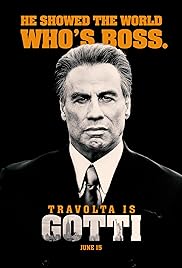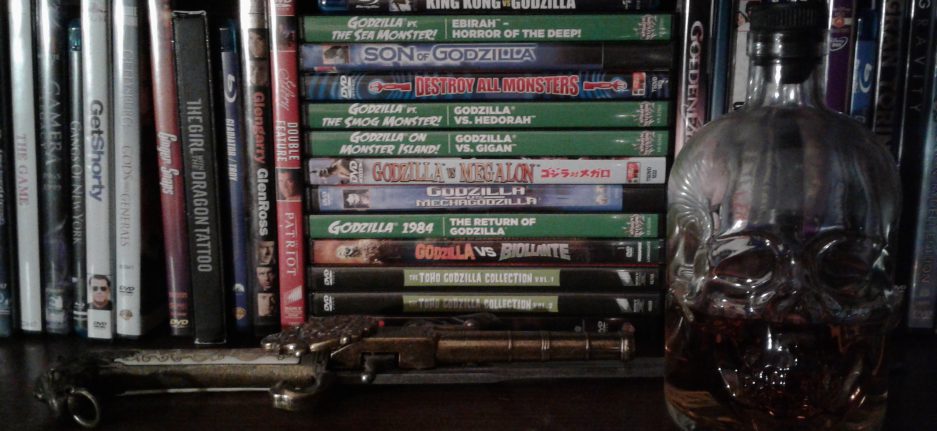It doesn’t come as much of a surprise to me these days to see a gangster flick that, more or less, sides with the gangsters. I mean, they’re interesting characters, and their often dual natures – one dealing with the criminal underworld, the other trying to maintain a healthy family life – can make for some compelling drama, all of it peppered with some requisite bloodshed. It’s a classic formula. Thing is, as much as those films focus on and work from the point of view of the criminals, it’s rare to see the film actively glorify its centerpiece crook. Scarface comes to mind (the de Palma version, natch), but precious little else. Sure, we get intimate and sympathetic portrayals of goons like Richard Kuklinski and Whitey Bulger in The Iceman and Black Mass, respectively, but they’re character pieces, providing a bit of sympathy to its nasty subject in spite of (and often to contrast with) the horrors they inflicted on others. Gotti, meanwhile, is a bit of a different animal.

We’re presented with the story, kind of, of the Teflon Don hisself, John Gotti. We see him, sort of, rise to prominence within the Gambino crime syndicate, fend off indictment after indictment, raise his family, seize control of the criminal organization, and ultimately sit in a cell until his death. As per usual, we’re shown his home life, in a way, so as to show the man as a man, a human, rather than just a bloodthirsty animal.
Thing is, we’re not given those things, not really. I have no idea what director Kevin Connolly was going for, considering the final product is a hacked-up mess with no flow, extreme pacing issues, tone problems, and a penchant for downright fellating Gotti hisself.
Up until its release, I saw neither hide nor hair of this film, no trailers, only bits of industry gossip lauding Travolta’s ability to look just like the Dapper Don. For the record, I don’t think they look all that similar, save maybe the hair, but, hey, whatever. Then, right before I hit the theatre this afternoon, I get word that the film garnered a perfect 0 on Rotten Tomatoes. (It remains at that score as I write this.) I have no idea what to expect, except for some sort of cinematic failure. What I encountered was worse than I could have thought.
Let’s start with the structure. Unlike the aforementioned films, we’re not given a straightforward narrative of Gotti’s life and career, but instead are presented with a bit of him at the height of his power, cut to his earliest gangland rumblings, then cut to him meeting with his son after years of incarceration. We continuously jump back and forth with no regard for rhythm or purpose, often sticking in the past for quite some time before heading back to the near-present for a minute or two and then diving back into the deep end of history. All the while, we get Gotti narrating things for us, telling the story that’s developing on screen and mentioning characters we either barely know or can’t distinguish from others. This persists even after his character is dead, for some reason.
This narration is buttressed in the flashbacks by subtitles telling us who certain people are, but neither information source is very helpful: we aren’t given any time to absorb these people into our minds, nor can we usually internalize why we should care about any of them. None are given much in the way of development, so their cardboard cutouts float in and out of the story at will, and I guess we’re just supposed to care because. Sorry, can’t do it.
This lack of character development sadly isn’t relegated to the side characters, but rather bleeds into every person on the screen. Hell, the most we get to know about Gotti is that he’s a tough guy, a goombah, and has some ambition, and maybe he loves his family. I shouldn’t have to qualify that last bit with a “maybe”, but I was left no choice. We never spend much time with him and his family, and several members, particularly his daughters and son Peter, are basically written out shortly after they’re introduced, though Peter does briefly return near the very end. At one point, one of his kids is involved in an accident; we know nothing about the boy, save that he just got straight A’s on his report card and his father is thus proud of him, smiles all around – basically, we know he’s due for some ironic karmic punishment. But since all we have is this tiny baseline and maybe thirty seconds of screen time with him, the family’s anguish over his accident isn’t shared by the audience, because, well, we just met him in passing. This sort of thing happens throughout, and the manic pacing, jumping from instance to instance with no rhyme or reason and only a bare-bones unifying plot narrative, exacerbates the issue. I know the name Sammy “The Bull” Gravano, but I’m not sure why, and the film doesn’t help me with this, thrusting this known person into the wild background with everyone not named “John J. Gotti”. In the end, we have no reason to care about anyone, and that seems like an issue to me. We aren’t given any special insight into John Gotti the man, the mafioso, the community guy, nothing of substance, making me wonder what the point was in the first place. Oh, apparently, given the occasional cuts to local testimonials, we’re meant to see Gotti as a tragic figure, a criminal who was actually better for the world than the jerk-ass government that only wanted to toss him in prison. Sure, okay.
Indeed, the film’s tone suffers from this internal desire to beatify the man while still showing his vicious streak. We’re told he loves his family, that he supports his community and whatnot, but we’re never really shown these things, just his ruthless surge to power and his middle-finger-waving at the powers-that-be. What may or may not have been meant as a character study like Black Mass or even The Godfather, we get a glorification of a mobster for being a mobster, the cinematic equivalent of the legion of rappers and other artists who have co-opted Gotti’s name for some baked-in underworld cachet without the effort of cultivating it.
It was fitting, then, that Pitbull was given a prime spot in the music department, but here we see another failing. Songs are tossed into certain scenes, ostensibly for emotional effect and/or temporal placement, but it just doesn’t work. Our first example, near the beginning, is Gotti’s first hit, which is backed by Deep Purple’s “Smoke on the Water”; it’s time-appropriate and sounds good (when the mix isn’t dropping for no reason, that is), but it doesn’t mean anything in the context of the scene. The famous theme from Shaft is included shortly thereafter, though it adds nothing and clashes with the subject matter (John Shaft, after all, was something of a lawman, even if he didn’t officially carry a badge); the Animals’ “House of the Rising Sun” is played as Gotti’s casket drives through town, for reasons unbeknownst to me; and Pitbull just can’t leave well enough alone, inserting his own “Don’t Stop the Party” during a block party in the mid-80s. There’s actually a lot of good music here, but it’s all completely wasted, thrown in seemingly at random after a while.
The only thing keeping things from completely sinking is Travolta, but his performance is only okay at best. We got strong outings from Michael Shannon, Al Pacino, and Johnny Depp when they portrayed gangsters, but Travolta is only good here compared to his recent work in straight-to-video action schlock, otherwise he’s just okay. The rest of the cast is uniformly wasted, mostly due to the lack of character development and the harsh pacing. Spencer Lofranco was almost gifted a solid supporting role as John Jr, but his character’s lack of fleshing-out undercuts both his decent performance and his ultimate success at the end, an event we’re apparently meant to accept as a positive thing regardless of the law-breaking and whatnot. Stacy Keach, playing another member of the Gambino syndicate, mostly works, but his gruff Georgian demeanor doesn’t jive with the goombah affectation that everyone else is sporting and he’s attempting.
But it’s the work of editor Jim Flynn and writers Lem Dobbs and Leo Rossi that make keep the cast from achieving much of anything. They’re given little interesting to say, the underworld politics are kept off-puttingly dense, and the dramatis personæ are so boundless that none are allowed to flourish in the narrative. Meanwhile, what is there on screen is cobbled together in such a manner as to further obfuscate any ounce of character, motivation, and point. Who’d’ve guessed a film with 44 named producers (WHAT!?) would come out so disjointed?
This thing is an absolute mess, and it looks and feels it throughout. Sadly, it’s not an enjoyable mess, like Birth of the Dragon or something, so I can’t even recommend this thing for some ironic fun. It’s not fun, not at all, not ever. Its approximate 100-minute runtime feels almost halved because of the sloppy structure, yet it packs a concentrated punch of ineptitude and unearned self-importance, not to mention the issues regarding its reverent tone. Don’t bother with this one, kids, unless you’re deeply curious about Travolta’s efforts. There isn’t enough teflon on Earth to keep the criticisms from sticking to this stinker, lemme tell ya.

2 thoughts on “Gotti”